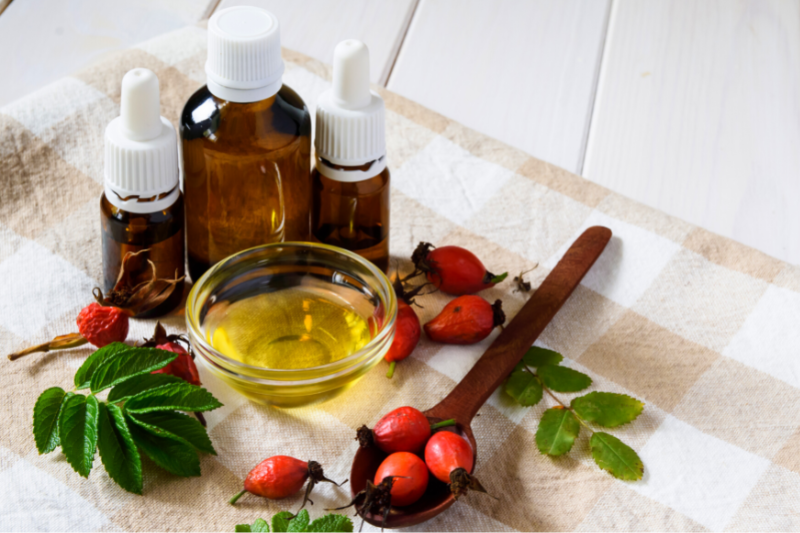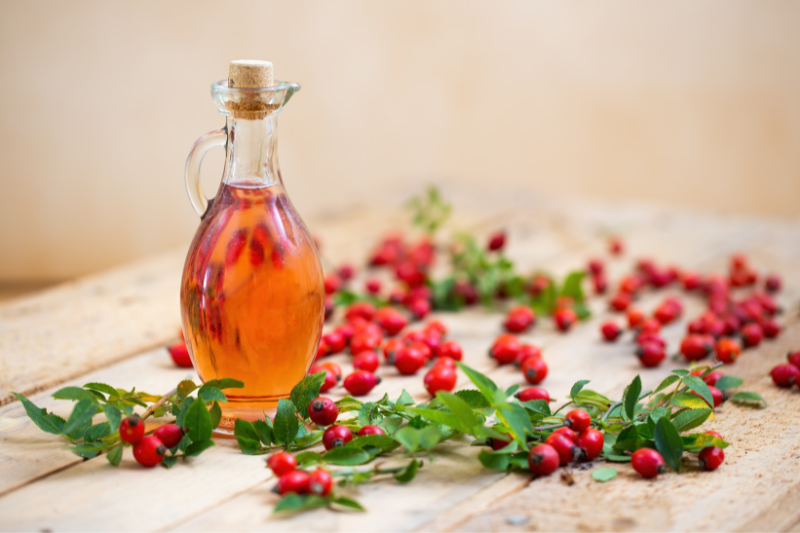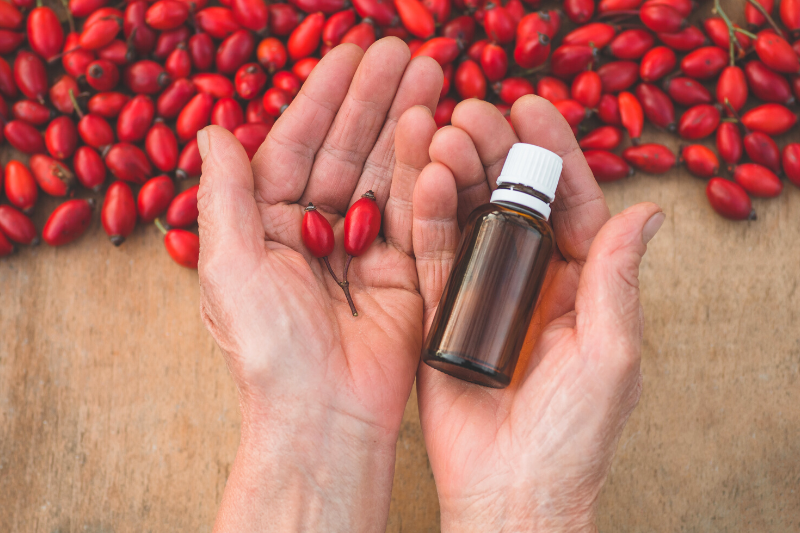Are you interested in learning the difference between rosehip oil and rosehip seed oil? Then you have come to the right place!
Rosehip oil and rosehip seed oil are both popular products that are used in many skin care regimes and for a good reason. They are both totally nutritious and wonderful for the skin. Although these terms are sometimes presented as the same, they are actually two separate products.
So if you have been thinking about incorporating rosehip oil/rosehip seed oil into your skin care routine, it is a nice idea to learn the differences between the two products so you can make the best purchase decision.

So, rosehip oil vs rosehip seed oil. What’s the difference? Is rosehip seed oil the same as rosehip oil? Nope!
Both rosehip oil and rosehip seed oil are produced from several different species of roses. Rosehip seed oil is the oil that is pressed only from the rosehip seeds. Rosehip oil, on the other hand, is produced with a mixture of oils that come from various parts of the rosehip, such as the flesh, skin and seeds.
Rosehip seed oil is great as it is filled with essential fatty acids, antioxidants and more. Likewise, rosehip oil is great as it incorporates various nutrients from all aspects of the fruit, not limited to the seeds.
So, rosehip seed oil vs rosehip oil. Let’s talk about what each oil is and how it is produced, what nutrients they contain and their benefits to get an understanding of what their differences are.
What Is Rosehip Oil?

Rosehip oil is produced from the fruit and seed of a rose plant, with the most popular rose species being the rosa rubiginosa and the rosa canina, commonly sourced from Chile.
Rosehip oil can sometimes be confused with rose oil. However, rose oil is produced from the petals of a rose. Rosehip oil, however, is made by pressing the entire fruit of the rosehip, which includes both the seed, the skin and the pulp.
Rosehip oil has been used and adored since ancient times. It is loaded with vitamins, minerals and essential fatty acids, and it is totally healing, soothing and moisturizing on the skin.
It contains a nutrient known as phenols which produce small levels of anti-fungal, antibacterial and antiviral qualities.
Rosehip oil is frequently used to carry essential oils to the skin, and it works wonderfully as a carrier oil.
Benefits Of Rosehip Oil
There are plenty of benefits when using rosehip oil such as moisturizing the skin, soothing, calming and healing the skin. The fatty acids and antioxidants present in rosehip oil mean it is good for cell and tissue regeneration, reducing the appearance of fine lines, and scars and can be used to heal certain skin wounds.
The pulp and skin of the rosehip fruit is full of provitamin A and can produce up to 5 times the amount of this nutrient than the rosehip seed. The seed of the rosehip is full of essential fatty acids and antioxidants that are great for healing and moisturizing the skin. So, you are getting the best of both worlds when opting for rosehip oil vs rosehip seed oil.
What Is Rosehip Seed Oil?

Rosehip seed oil is produced from the seed of the rosehip fruit with the most popular species being that of the rosa canina and rosa subiginosa which are both commonly sourced from Chile.
Unlike rosehip oil where the oil is produced from the entire fruit and seed, rosehip seed oil, as the name suggests is made entirely from the seeds of the rosehip fruit.
Rosehip seeds are full of essential fatty acids and antioxidants, and like rosehip oil, it also contains beta-carotene (provitamin A). Rosehip oil, however, sometimes contains up to five times the amount of provitamin A compared with rosehip seed oil. This is because much of this beta carotene is produced in the flesh and skin of the rosehip fruit.
Benefits Of Rosehip Seed Oil
Rosehip seed oil is filled with essential fatty acids including linoleic acid and omega 3, antioxidants and certain vitamins and minerals.
These nutrients provide benefits to the skin such as cell regeneration, soothing the skin, moisturizing and anti-ageing.
Is Rosehip Oil The Same As Rosehip Seed Oil?
Rosehip seed oil vs rosehip oil, are they the same?
Rosehip oil and rosehip seed oil are terms that are often used interchangeably, but they do have their differences. They are very similar products with varying amounts of fatty acids, vitamins and minerals. Though they have their differences, both oils will work great on the skin.
In terms of processes to create these oils and the nutrients, they do vary and I will talk more about this below.
What Is The Difference Between Rosehip Oil And Rosehip Seed Oil?
So what is the difference between rosehip oil and rosehip seed oil?
As I have mentioned earlier in the article, the biggest difference between rosehip oil and rosehip seed oil is that they are produced with different parts of the rosehip fruit.
Rosehip seed oil is produced using only the seeds of the rosehip fruit which is full of essential fatty acids, linoleic and omega 3. It also contains antioxidants, vitamins and minerals which are great for the skin.
Rosehip oil, on the other hand, is made using all parts of the rosehip fruit including the flesh, the skin and the seed.
This means you are getting the best of all the rosehip has to offer. The seeds of the rosehip, however, are known for containing higher levels of essential fatty acids. Rosehip seed oil can therefore contain higher levels of essential fatty acids than rosehip oil alone. Rosehip oil, however, contains up to five times more beta carotene, also known as provitamin A, compared with rosehip seed oil.
Rosehip Oil Vs Rosehip Seed Oil

So, now we have talked about rosehip oil and rosehip seed oil difference, let’s discuss their similarities!
Similarities Between Rosehip Oil And Rosehip Seed Oil
Contain Same Nutrients
Although slightly varying, both rosehip oil and rosehip seed oil contain the same nutrients. These include the essential fatty acids linoleic acid and omega 3, antioxidants, vitamins and minerals.
Moisturizing
Rosehip oil and rosehip seed oil are effective treatments for skin dryness, scarring and fine lines. They are both good for skin cell regeneration and free radical damage and provide many other benefits to the skin.
Cost Effective Skin Treatments
Rosehip oil and rosehip seed oil can be used as effective skin healing treatments. Applying either of these products to your skin before bed and leaving it on overnight helps in repairing damaged skin and giving your skin a new breath of life.
Can Be Used As A Carrier Oil
Rosehip and rosehip seed oil can be used as a carrier oil for your essential oils. They are both low in odour, yellow in colour and are a thin but moisturizing consistency.
Rosehip Vs Rosehip Seed Oil For Skin
On the skin, rosehip oil and rosehip seed oil are both totally beneficial. They are both going to provide a beautiful soothing effect, deeply moisturize and provide skin healing if used consistently on most skin types.
You can use rosehip or rosehip seed oil on scars, stretch marks, damaged skin and more!
Rosehop Oil Or Rosehip Seed Oil For Face
Rosehip oil and rosehip seed oil are full of goodness and will provide the facial skin with great moisture and protection.
When used consistently, they can both help with the reduction of fine lines and scarring, fight free radical damages, maintain skin elasticity, reduce dark spots and more!
Conclusion – Which Is Better, Rosehip Oil Or Rosehip Seed Oil?
So is rosehip oil better than rosehip seed oil? It really depends on what you are using the oil for and your personal preferences.
I hope you have enjoyed this guide explaining the differences between rosehip oil and rosehip seed oil. Hopefully, you now have a better understanding of their differences and similarities and why they are both so great for your skin.
Whichever you choose to purchase, I hope you love it as much as I do.
Also learn how rosehip oil compares to jojoba oil here, grapeseed oil here and all the best carrier oil to use if you have sensitive skin. Or check out all our guides to using rosehip oil here. You can also find a guide to using rosehip oil and retinol here as well as using rosehip oil under eyes here and the right way to store it here.



Comments are closed.